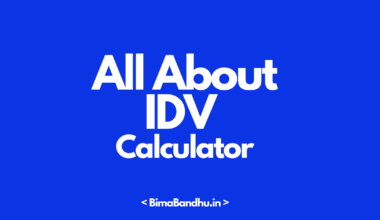‘Health is wealth’ – it is a timeless adage that transcends time and borders, reminding us that our well-being is the most precious asset we possess. The significance of safeguarding our health cannot be overstated in India – a country that is characterized by its rich cultural heritage and diverse population. However, the darker side of the picture is not easy to digest. As per recent statistics, the Consumer Price Index for health in India has surged at an alarming average rate of 79% in the last decade alone, making quality healthcare increasingly unaffordable for many.
In the face of rising healthcare costs, health insurance emerges as an indispensable tool that not only protects your financial stability but also ensures access to the best medical care when you need it the most. With the growing number of health insurance providers and plans in the Indian market, it has become crucial to get into the details of health insurance comparisons and analyze various options before making a decision.
In this blog post, we delve into the importance of health insurance in our lives and why a comprehensive health insurance comparison is paramount to secure your health and financial future.
What Does Health Insurance Comparison Mean?
Health insurance comparison refers to the process of evaluating and analyzing different health insurance plans available in the market to determine which one best suits an individual’s or family’s specific healthcare needs. It involves carefully assessing various factors such as coverage, benefits, premiums, exclusions, deductibles, co-payments, a network of hospitals, and more.
When you deep dive into health insurance comparison in India, you can make informed decisions based on your unique requirements and budgetary constraints. By examining multiple options, you can identify the plan that provides the most comprehensive coverage and value for your healthcare needs. It allows you to understand the scope of coverage for hospitalization expenses, surgeries, diagnostic tests, pre and post-hospitalization expenses, and other relevant medical services.
Besides this, comparing health insurance plans also enables you to evaluate the reputation and track record of different insurance providers in terms of customer service, claim settlement efficiency, and reliability. This information is crucial to ensure that the chosen insurance company is capable of providing the necessary support and timely assistance during medical emergencies.
Ultimately, health insurance comparison empowers individuals like you to make an educated choice by weighing the pros and cons of different plans. It provides an opportunity to strike a balance between comprehensive coverage, affordability, and value for money, ensuring that the chosen plan effectively protects your health and financial well-being.
Why is Health Insurance Comparison Important?
Health insurance comparison is important because:
- It helps you find a plan that offers comprehensive coverage at an affordable premium.
- Comparing plans allows you to choose one that aligns with your specific healthcare requirements and financial constraints.
- By comparing different types of health insurance plans, you can identify the ones that provide maximum benefits for hospitalization, surgeries, medications, and other medical services.
- You can evaluate the network of hospitals associated with each plan to ensure easy access to quality healthcare services with a thorough health insurance comparison.
- Comparing insurance providers helps you assess their reputation for smooth and efficient claim settlement processes.
- By comparing plans, you can determine which ones offer coverage for pre-existing medical conditions.
- Comparison of health insurance also helps you understand waiting periods and renewal conditions. This ultimately assists you in making an informed decision about when coverage will begin and how policies can be renewed.
- Comparing insurance providers enables you to gauge the customer service quality and satisfaction levels of existing policyholders.
- Health insurance comparison also ensures that you select a plan that safeguards your health and financial well-being in the long run.
By comparing health insurance plans, you can make an informed choice that not only meets your healthcare needs but also provides peace of mind during uncertain times.
Also Read: What is 10 Lakh Health Insurance?
Why Should You Compare Health Insurance Online?
Online health insurance comparison offers several advantages and benefits which make it a convenient and efficient method for selecting the most suitable plan. Here’re nine reasons why you should compare health insurance online:
1. Accessibility and convenience
There are several online platforms that provide easy access to a wide range of health insurance plans. They allow you to compare them from the comfort of your home or office, at any time that suits you.
2. Time and effort saving
Comparing health insurance online saves you the hassle of visiting multiple insurance offices or contacting individual agents. You can gather all the necessary information in one place and compare plans quickly and efficiently.
3. Comprehensive information
Many online insurance information portals offer detailed information about health insurance plans, including coverage details, benefits, premium costs, exclusions, and additional features. This allows you to make an informed decision based on complete and transparent information.
4. Wide range of options
Online health insurance comparison also helps you in knowing about numerous insurance providers and their plans, thus giving you a broader selection to choose from. You can explore different policies, features, and prices to find the best match for your needs.
5. Instant premium quotes
Online insurance comparison tools often provide instant premium quotes based on your inputs and preferences. This helps you understand the cost implications of different plans to make a budget-conscious decision.
6. User reviews and ratings
Online comparison of health insurance policies makes it easier for you to obtain authentic user reviews and ratings for insurance providers and their plans. These insights can provide valuable information about customer experiences, claim settlement processes, and overall satisfaction levels.
7. Ease of comparison
Online comparison tools allow you to compare multiple health insurance plans side by side, making it easier to evaluate their features, benefits, and costs. This helps in identifying the most suitable plan that meets your requirements.
8. Online application and purchase
Once you’ve compared health insurance plans and selected the one that suits you best, you can often complete the application and purchase process online. This eliminates the need for physical paperwork and saves time.
9. Instant policy generation
Online health insurance purchase post comparison typically generates policy documents instantly upon successful payment transfer. This means you can have your policy in hand without any delays, ensuring timely coverage.
Also Read: All About Health Insurance for Parents
How Does Health Insurance Plans Comparison Chart Look Like?
Typically, a health insurance plan comparison chart includes several parameters that define the corresponding insurance coverage. Here’s an example of how such a chart may look like:
| Plan Name | Premium (P.A.) | Coverage | Co-payment | Network Providers | Additional Benefits |
| Plan A | Rs. 5000 | Comprehensive | 20% | Extensive | Wellness programs |
| Plan B | Rs. 15,000 | Basic | 30% | Limited | Maternity coverage |
| Plan C | Rs. 9000 | High-end | 10% | Extensive | Pre-existing disease coverage |
| Plan D | Rs. 11, 000 | Comprehensive | 50% | Limited | Prescription drugs |
In such a health insurance comparison chart, each row represents a different health insurance plan, and the columns provide specific details about each plan. It helps individuals compare different health insurance plans side by side, allowing you to easily identify the key features, costs, and benefits of each plan and make an informed decision based on your specific requirements.
The best part is that you can create a health insurance plans comparison chart for yourself, considering the parameters that particularly matter to you. It is up to you to decide the selection of parameters for this chart based on whether you want to buy individual or family floater health insurance.
How to Compare Health Insurance Plans in India?
You can follow any of the two approaches for health insurance comparison in India. Each of them is defined as follows:
Steps to Compare Plans on an Insurance Provider’s Official Website
-
Research the insurance provider
Start by researching the insurance providers and understanding their reputation, financial stability, and claim settlement track record. This will ensure that you’re considering a reliable and trustworthy insurance company.
-
Explore their plans
Visit the official website of the chosen insurance provider(s) and explore different health insurance plans they offer. Review the plan details, coverage options, benefits, exclusions, waiting periods, and any additional features or riders available.
-
Assess coverage and benefits
Carefully analyze the coverage provided by each plan and assess how well it aligns with your specific healthcare needs. Consider factors like hospitalization expenses, surgeries, diagnostic tests, pre and post-hospitalization expenses, maternity benefits, and other relevant medical services.
-
Evaluate premium costs
Compare the premium costs for each plan, considering both the initial premium amount and any potential future premium increases. Ensure that the plan’s cost fits within your budget while still offering adequate coverage.
-
Check the network of hospitals
Look into the network of hospitals associated with each plan. Ensure that the network includes reputable healthcare institutions in your desired locations for easy access to quality medical services.
-
Review claim settlement process
Understand the claim settlement process of the selected insurance provider, including the documentation requirements, claim submission procedure, and average turnaround time for claim settlement. A smooth and efficient claim settlement process is crucial in times of need.
Also Read: All About Incurred Claim Ratio
Steps to Comparing Plans on Insurance Aggregator Portals
-
Choose a reliable aggregator portal
Select a reputable insurance aggregator portal that provides comprehensive information about various health insurance plans in India. Research and ensure that the aggregator portal is reliable, unbiased, and offers up-to-date information.
-
Provide relevant information
Enter the required details on the chosen portal, such as your age, family members to be covered, pre-existing conditions, desired coverage amount, and any specific preferences/requirements you may have.
-
Compare multiple plans
Explore and compare different health insurance plans provided by distinct insurance companies. Pay attention to the coverage details, benefits, premium costs, deductibles, co-payments, and waiting periods for each plan.
-
Use filters and sorting options
Utilize the filter/sorting options available on these portals to narrow down the plans based on your specific preferences, such as coverage type, premium range, network hospitals, and additional features.
-
Read reviews and ratings
Take advantage of user reviews and ratings provided on the aggregator portal. These insights can help you understand the experiences of policyholders with different insurance plans and companies.
-
Shortlist and compare
Shortlist a few plans that align closely with your requirements and compare them side by side. Assess the pros and cons of each plan, considering coverage, benefits, premiums, claim settlement efficiency, and customer satisfaction.
-
Make an informed decision
Based on your analysis and comparison, select the health insurance plan that best fits your needs, offers comprehensive coverage, aligns with your budget, and is provided by a reliable insurance company.
Disclaimer: It’s essential to read the policy wordings, terms, and conditions of the selected health insurance plan in detail before making the final decision.
How to Compare Health Insurance Companies in India?
Similar to comparing health insurance plans, it is equally important to compare health insurance companies in India. Here are the steps to be followed:
Step 1: Research and gather information
Begin by conducting thorough research on different health insurance companies operating in India. Gather information about their history, market presence, ownership, and regulatory compliance. You can visit their official websites, explore their product offerings, and take note of their unique selling points.
Step 2: Check the financial stability
Evaluate the financial stability and solvency of each insurance company. This can be done by reviewing their financial reports, credit ratings from recognized agencies, and industry rankings. Financial stability is crucial as it ensures the company’s ability to meet claim obligations.
Step 3: Assess claim settlement track record
Look into the claim settlement track record of each insurance company. A higher claim settlement ratio generally indicates a more efficient and customer-friendly insurer.
Step 4: Consider customer service
Evaluate the quality of customer service provided by each insurance company. Look for reviews and feedback from policyholders to assess their experiences with the company’s customer support, responsiveness, and complaint resolution process. Prompt and efficient customer service is essential when dealing with health insurance matters.
Step 5: Compare premium costs
Compare the premium costs offered by different health insurance companies for similar coverage and benefits. Consider the affordability of premiums, keeping in mind your budget and the value you receive in terms of coverage.
Step 6: Review their network of healthcare service providers
Assess the network of hospitals, clinics, and doctors associated with each insurance company. A wider network ensures better access to healthcare facilities and providers in your preferred locations.
Step 7: Analyze additional benefits and features
Consider additional benefits and features offered by each insurance company. These may include coverage for alternative treatments, no-claim bonus, and loyalty rewards. Such features can enhance the overall value and suitability of the health insurance plan.
Step 8: Seek recommendations and feedback
You should also seek recommendations from trusted sources, such as friends, family members, or insurance advisors, who have prior experience with health insurance companies. Their insights and feedback can provide valuable information about the reputation and reliability of different insurers.
Step 9: Evaluate complaint ratios
Review the complaint ratios of different insurance companies. This information is usually provided by regulatory authorities and reflects the number of complaints received against an insurer relative to their business volume. Lower complaint ratios indicate better customer satisfaction and service quality.
Step 10: Consider company reputation and expert ratings
Take into account the reputation and expert ratings of insurance companies. Recognized ratings agencies provide assessments and rankings based on various parameters like financial strength, customer service, and claim settlement efficiency.
Also Read: What Does Copay in Health Insurance Mean?
FAQs
Why should I compare health insurance plans?
Comparing health insurance plans allows you to find the most suitable coverage, benefits, and costs that align with your specific healthcare needs and financial situation.
What factors should I consider when comparing health insurance plans?
Factors to consider include coverage, benefits, premiums, deductibles, co-payments, network of providers, claim settlement process, additional features, and customer satisfaction.
Should I only compare premiums when choosing health insurance?
It’s essential to consider the overall value of the plan, including coverage, benefits, and customer service, along with premiums. Cheaper premiums may result in limited coverage or higher out-of-pocket expenses.
Can I compare health insurance plans online?
Yes, online platforms and insurance aggregator portals provide a convenient way to compare multiple health insurance plans simultaneously, allowing you to review features, costs, and benefits easily.
Are pre-existing conditions covered in health insurance plans?
Some health insurance plans provide coverage for pre-existing conditions, while others may have waiting periods or exclusions. It’s important to review the policy terms and conditions regarding pre-existing conditions.
How can I determine the claim settlement efficiency of an insurance provider?
You can assess the claim settlement efficiency by reviewing the insurer’s claim settlement ratio, which indicates the percentage of claims settled in comparison to the total claims received. Higher ratios generally indicate better efficiency.
Should I consider customer reviews when comparing health insurance plans?
Genuine customer reviews and feedback can provide insights into the insurer’s customer service quality, responsiveness, and overall satisfaction levels. They can be helpful in understanding the experiences of policyholders.
Can I switch health insurance plans later if I am not satisfied?
Yes, you can switch health insurance plans at the time of policy renewal. However, it’s important to carefully evaluate your needs and consider any waiting periods or exclusions that may apply to the new plan.
Is it necessary to consult an insurance advisor when comparing health insurance plans?
While not necessary, consulting an insurance advisor can provide expert guidance and help clarify any doubts or questions you may have during the comparison process.
Remember, it’s always recommended to thoroughly read the policy documents before finalizing any health insurance plan.
TL;DR: Benefits of Health Insurance Comparison
- Cost-effective coverage tailored to your needs
- Maximum benefits for comprehensive healthcare
- Easy assessment of network of hospitals for quick access to quality care
- Efficient claim settlement process for hassle-free reimbursements
- Additional feature selection for enhanced value
- Coverage for pre-existing conditions for comprehensive protection
- Better understanding of waiting period and renewal conditions
- Easy to gauge customer satisfaction for reliable service.
- Long-term financial protection against rising healthcare costs
- Convenience, transparency, and instant quotes






